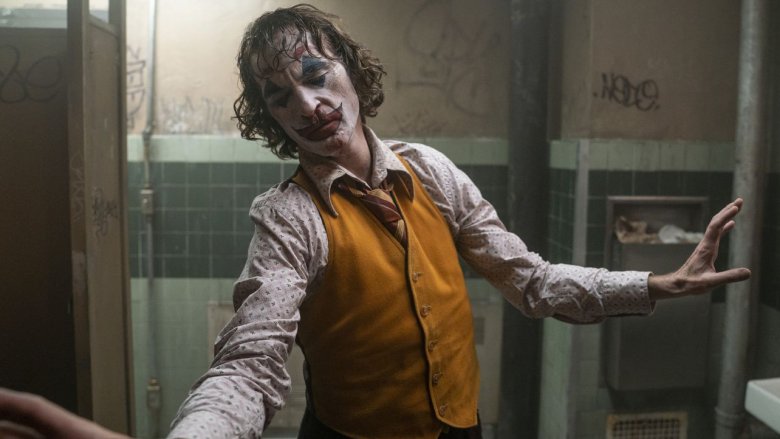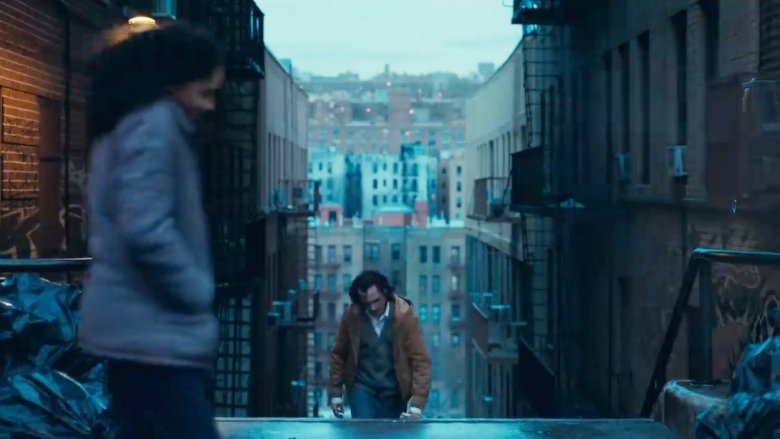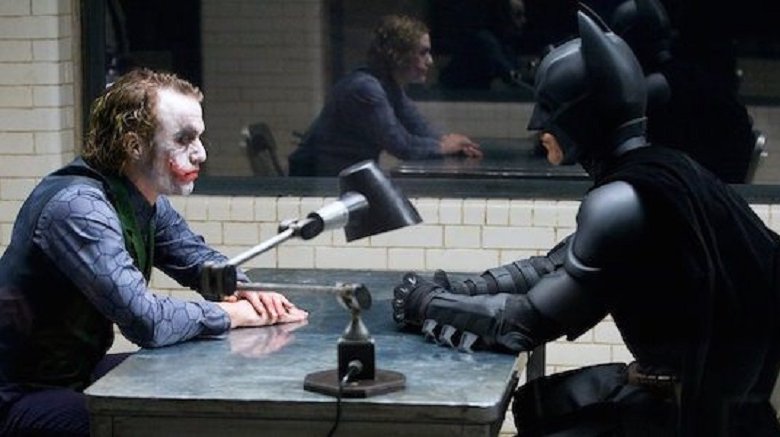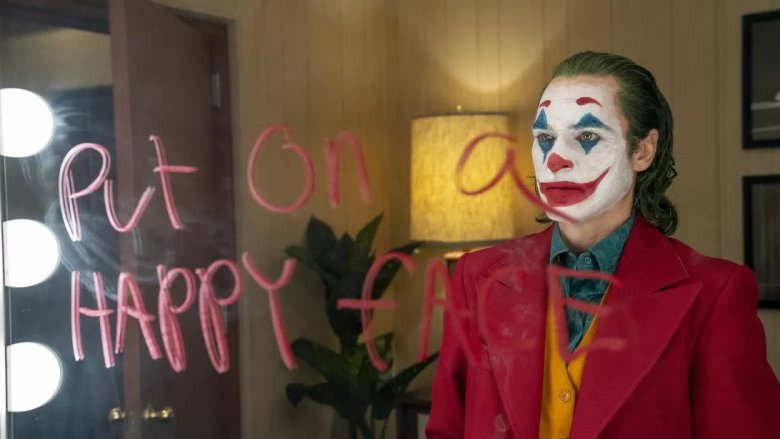The Real Reason Batman Isn't In The Joker Movie
The Clown Prince of Crime is back on the silver screen — but a certain someone is missing from the proceedings.
Much has been made of the fact that Joker, which stars Joaquin Phoenix as the iconic DC villain, is a film that sports a distinct lack of Batman. The murderous baddie has only ever appeared as an antagonist in films centered on the Caped Crusader up until this point, but for Joker, writer/director Todd Phillips and co-writer Scott Silver chose to keep the focus squarely on the guy in the clown makeup. It's a bold choice — but why did they make it?
It's understandable that fans would be a bit perplexed at the decision to completely exclude Batman, as the two characters have long been depicted as yin and yang, two sides of the same coin. Both in the comics and in television and film (particularly 1989's Batman and 2008's The Dark Knight), the characters have often been held up as mirror images of each other, and used to ask provocative questions about such things as the effect of trauma on the human psyche, and the slippery nature of the concepts of good and evil.
The dynamic between the Joker and Batman has been mined for great comics and great cinema — but Phillips and Silver wanted to tell a different story, and this much is clear from the very time period in which they set their film.
Joker's time frame doesn't work for Batman
Joker is famously influenced by the works of Martin Scorsese, who was at one point attached to the film as a producer before departing to work on the Netflix original film The Irishman. The flick takes its narrative and visual cues from two of the master filmmaker's movies in particular: 1976's Taxi Driver and 1983's The King of Comedy, which starred Robert De Niro (who also appears in Joker) as a failed comedian whose rage curdles into obsession, and ultimately spirals into violence.
As such, Joker takes place in a world that is very recognizably retro; the film is set in 1981, in a grimy, seedy Gotham that is more visually reminiscent of late '70s or early '80s New York City than any previous cinematic rendering. Phillips has said that the primary reason for making Joker a period piece was to distance it as much as possible from the other films in the Worlds of DC franchise — but it also had the effect of creating a grounded, realistic setting in which a gadget-laden vigilante dressed as a bat would seem rather out of place.
This isn't to say that Bruce Wayne doesn't appear in Joker; he does, as a child of perhaps ten years old. (His father, Thomas Wayne, serves as one of the film's antagonists.) His appearance was revealed in the movie's first full-length trailer, all the better to drive home to audiences the idea that in Joker, there would be no Dark Knight swooping in to save the city.
The relationship between Joker and Batman has been examined plenty
In a way, this choice makes a great deal of sense. After all, Joker features one of the most gifted actors of his generation throwing himself into the role in a wholly committed performance which just might significantly shift the public's perception of comic book films in general — which just happens to be a perfect description of The Dark Knight, a film in which the Joker/Batman dichotomy took center stage, and for which the great Heath Ledger won a posthumous Academy Award for Best Supporting Actor.
Phoenix has said that he was supremely uninterested in drawing inspiration from Ledger's iconic performance, or for that matter, from the performances of any other actor to have ever portrayed the villain. Similarly, Phillips and Silver clearly had no interest in going back to anything that had ever been done onscreen with the character of the Joker before, up to and including leaning on the character's relationship with Batman in order to examine what makes him tick.
This is because, at the end of the day, the pair weren't exactly trying to make a comic book film in the traditional sense of that phrase. Rather, they set out to make a down and dirty, gritty character study of a twisted individual in the vein of Scorsese and the other auteurs of 1970's "New Hollywood" through the lens of a well-established and popular character. Bringing Batman to the party would have negated everything the filmmakers were trying to accomplish — and it almost certainly would have kept Joker from being the singular, ambitious film that it is.
Joker isn't a Batman movie by design
Obviously, it's been proven that there is plenty of room for multiple cinematic interpretations of the Joker, and if Phillips, Silver, and Phoenix had wanted to make a more traditional superhero film in which Phoenix's Arthur Fleck is pushed over the edge, becomes a criminal mastermind, and runs up against Gotham's maybe-just-as-crazy protector, they absolutely could have. The facts is that Phillips conceived the project from the start as a grounded, gritty, standalone examination of the deteriorating psyche of one man, and this vision is the only thing that got Phoenix — for whom Phillips and Silver wrote the picture — on board.
Phoenix was even initially leery of including any references to the Wayne family at all, according to Phillips. In an interview with the New York Times, the director said, "[Phoenix] never liked saying the name Thomas Wayne. It would have been easier for him if the movie was called Arthur and had nothing to do with any of that stuff. But in the long run, I think he got it and appreciated it."
It's apparent that Phoenix understood what was special about Joker from the very beginning: simply put, the movie is one hundred percent its own thing, a singular vision, the story of one very, very troubled man. There will always be new screen interpretations of the character for the Dark Knight to butt heads with; assuming that director Matt Reeves' forthcoming 2021 reboot The Batman is successful (and we're pretty sure it will be), we're likely to see one of them within the next five years or so, facing off with Robert Pattinson's Bruce Wayne in one of that film's sequels.
But this movie is called Joker, and its focus is squarely on its own story and Phoenix's towering performance — as it should be.



